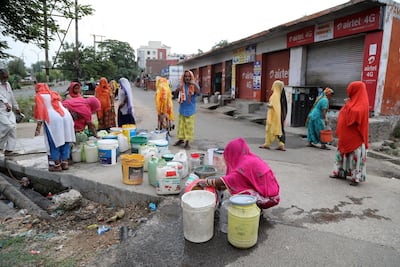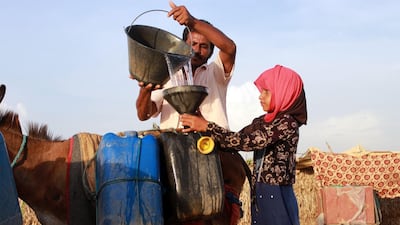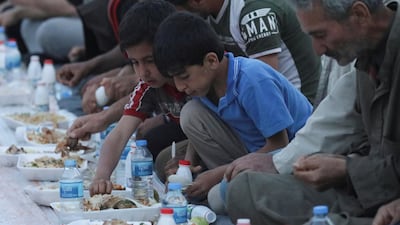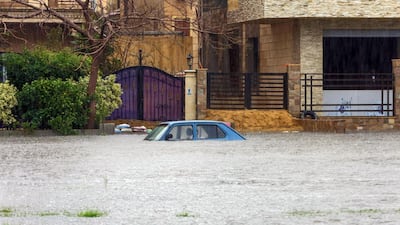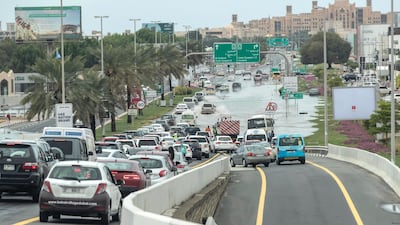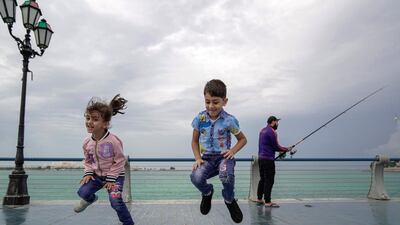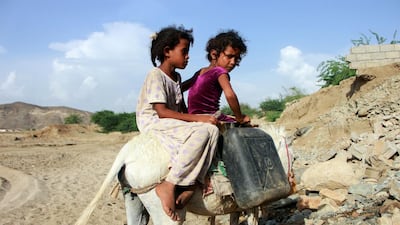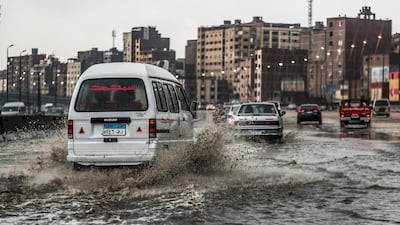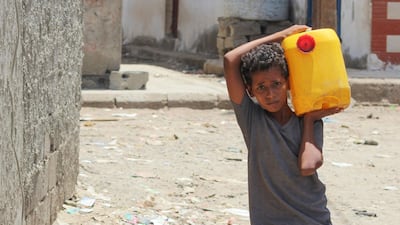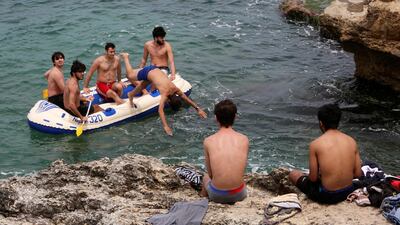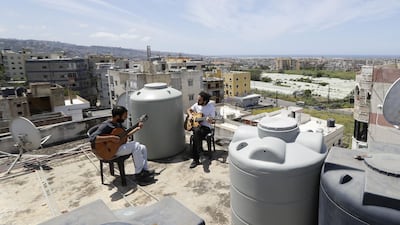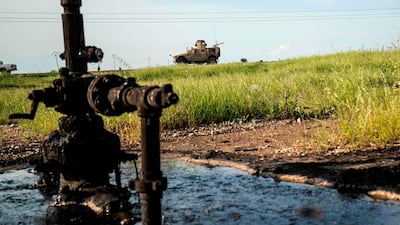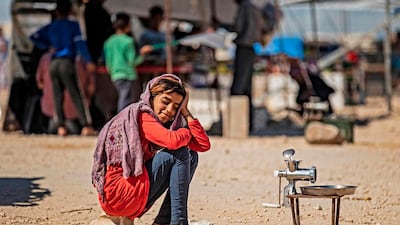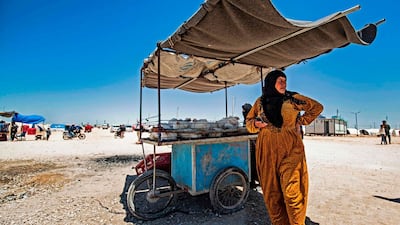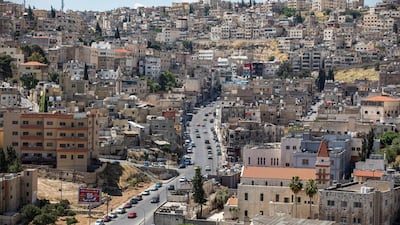When the primary weapon against fighting a worldwide pandemic is water, and you’re living in a water scarce region, a new layer of tension may not be so far away.
Covid-19 brings with it an unprecedented economic, health and humanitarian crisis. There are many impacts, and some are yet to be discovered. In the Arab world in particular, one issue requires increasing attention: the growing water crisis in an already volatile region.
The ongoing coronavirus pandemic is ringing an alarm bell, alerting us to the need to take immediate measures to ensure that citizens have a steady supply of water
According to the World Health Organisation, three billion people around the world lack basic hand-washing facilities.
This is particularly problematic, given that the WHO has advised that preventing the contraction of the coronavirus first begins at the individual level, with social distancing and rigorous hygiene.
Although washing is normally a simple task, it may become harder as summer approaches in the Middle East and North Africa (Mena), home to 12 of the 17 most water-stressed countries in the world.
The fact that coronavirus infection numbers are still relatively low in large parts of the Arab world provides an opportunity to put in place sustainable measures now that would prevent the situation from growing worse in the future.
According to the 2019 Global Peace Index, Mena is the world’s least peaceful region.
The last several decades have seen it plagued by instability and wars. Countries in the region are already challenged by a dramatic rise in refugees and internally displaced persons as a result of ongoing wars in Syria, Libya and Yemen, as well as instability in Iraq.
Jordan's reliance on aquifers
Take the example of Jordan. It receives less than 50 millimetres of rainfall per year and is heavily dependent on domestic aquifers for its water supply.
In the first few days of its coronavirus lockdown, Jordan saw complaints and concerns raised to authorities regarding access to water increase by almost 60 per cent.
While strict measures have been imposed to control the situation, it may become worse as the summer approaches.
In Syria, UNICEF is transporting clean water via lorries into some of the most devastated cities and IDP camps, but this is only a temporary solution and further highlights the need for better water management to combat future viral outbreaks.
Lebanon: relatively water-rich
In Lebanon the number of registered coronavirus cases has passed 800. Even though the Government of Lebanon took some early measures to limit the spread, a steady supply of water remains a concern – one that will continue beyond the current pandemic. Lebanon is a relatively water-rich country in a water-scarce region, with an average annual rainfall of 800mm.
However, the country suffers from a problem common in the developing world: one of poor and ineffective integrated water resource management.
Even some of Beirut’s wealthiest neighbourhoods lack access to a regular supply of water and are forced to rely on tankers. Water shortages affect over a quarter of the Lebanese population, with many low-income neighbourhoods receiving irregular and intermittent supply.
Although some countries have strong health care and resources necessary to face the pandemic, Mena as a whole is ill-equipped to face this global challenge.
Wash your hands 20 times a day?
The rise of the pandemic will increase the pressure on those whose healthcare systems are struggling. In these places, the best available option for many people would be to take matters into their own hands, so to speak, by washing them with soap and water.
Renowned Indian environmentalist and researcher Ranjan Panda found that the average person washes his or her hands around 18 to 20 times a day — not difficult to imagine if we think about all the activities we go through in a day, and uses approximately 40 litres of water doing so.
The need to do so is especially heightened during these overly cautious times. If one is being judicious, they may use half that amount of water.
Even so, this places significant strain on central and regional governments to secure water for densely populated urban centres and rural areas.
The GCC's share of challenges
The Gulf Co-operation Council countries also have to tackle water stresses. The UAE, a naturally arid country, is amongst several Gulf nations that rely upon the collection and treatment of wastewater (over 80 per cent) to supplement the minimal fresh water available. However, less than 50 per cent of the treated water is reused, highlighting the challenges of managing the system.
Erratic changes in climate are making matters worse. In early March, several countries in the wider Mena region were hit by severe storms. The heavy rain and widespread flooding left many disadvantaged urban areas in Cairo and other cities without potable water for a large part of the month.
While the added strain was short lived, the experience has served as a reminder of the need for governments to prepare for future severe weather events brought on changes in the climate, as well as environment or agricultural insecurity.
Given the current pandemic, the relationship between water and health security, and the risks shared between them, must be considered thoroughly and not in silos.
Countries in the region must strengthen their regional strategy and anticipate future events, like pandemics, that require us to use large amounts of water.
Scientists are still debating whether or not we will witness a decline in Covid-19 cases as temperatures rise with the arrival of summer. But even if this turns out to be true, it should not be a reason for governments and policymakers to let their guard down and neglect to craft a sustainable strategy for water resource management.
The ongoing coronavirus pandemic is ringing an alarm bell, alerting us to the need to take immediate measures to ensure that citizens have a steady supply of water.
A recent study by the World Resources Institute found that by spending a little over one per cent of global Gross Domestic Product over the next decade, the world could provide water security for all by 2030.
While global institutions can support the Mena region with expertise, lessons from other experiences, new technology and aid, it is imperative that governments in the Arab world channel policy planning efforts and resources to create resilience in water management.
The Arab Water Security Strategy 2010-2030 details the importance of alternative water resources, including desalination and the reuse of wastewater, as well as the need to collectively combat climate change.
But any strategy for integrated water management policies needs to go beyond securing supply. It must address the management and regulation of demand, too.
At the individual level, we can play a small, but important role in the overall story. The latest health advice for maintaining hygiene during the coronavirus pandemic recommends lathering one’s hands with soap for 20 seconds before rinsing.
By simply turning off the tap for those 20 seconds, each person can save one to two litres of water with every wash. Spread across all of humanity as we continue to fight this pandemic together, one or two litres become billions.
Ambika Vishwanath and Karma Ekmekji together have over 25 years of experience in water, peace and security and public policy
The specs: 2018 Nissan 370Z Nismo
The specs: 2018 Nissan 370Z Nismo
Price, base / as tested: Dh182,178
Engine: 3.7-litre V6
Power: 350hp @ 7,400rpm
Torque: 374Nm @ 5,200rpm
Transmission: Seven-speed automatic
Fuel consumption, combined: 10.5L / 100km
The five pillars of Islam
More on animal trafficking
UAE currency: the story behind the money in your pockets
Killing of Qassem Suleimani
Jetour T1 specs
Engine: 2-litre turbocharged
Power: 254hp
Torque: 390Nm
Price: From Dh126,000
Available: Now
F1 The Movie
Starring: Brad Pitt, Damson Idris, Kerry Condon, Javier Bardem
Director: Joseph Kosinski
Rating: 4/5
Mohammed bin Zayed Majlis
Specs
Engine: Electric motor generating 54.2kWh (Cooper SE and Aceman SE), 64.6kW (Countryman All4 SE)
Power: 218hp (Cooper and Aceman), 313hp (Countryman)
Torque: 330Nm (Cooper and Aceman), 494Nm (Countryman)
On sale: Now
Price: From Dh158,000 (Cooper), Dh168,000 (Aceman), Dh190,000 (Countryman)
UAE currency: the story behind the money in your pockets
Killing of Qassem Suleimani
RESULTS
%3Cp%3E%0D%3Cstrong%3E5pm%3A%20%3C%2Fstrong%3EWathba%20Stallions%20Cup%20%E2%80%93%20Handicap%20(PA)%20Dh70%2C000%20(Turf)%202%2C200m%0D%3Cbr%3E%3Cstrong%3EWinner%3A%20%3C%2Fstrong%3EAl%20Hazeez%2C%20Saif%20Al%20Balushi%20(jockey)%2C%20Khalifa%20Al%20Neyadi%20(trainer)%0D%3Cbr%3E%3Cstrong%3E5.30pm%3A%20%3C%2Fstrong%3EShams%20Gate%20Tower%20%E2%80%93%20Maiden%20(PA)%20Dh80%2C000%20(T)%201%2C200m%0D%3Cbr%3E%3Cstrong%3EWinner%3A%3C%2Fstrong%3E%20ES%20Sudani%2C%20Antonio%20Fresu%2C%20Hamad%20Al%20Marar%0D%3Cbr%3E%3Cstrong%3E6pm%3A%3C%2Fstrong%3E%20Al%20Bahr%20Towers%20%E2%80%93%20Handicap%20(PA)%20Dh80%2C000%20(T)%201%2C200m%0D%3Cbr%3E%3Cstrong%3EWinner%3A%3C%2Fstrong%3E%20AF%20Musannef%2C%20Tadhg%20O%E2%80%99Shea%2C%20Ernst%20Oertel%0D%3Cbr%3E%3Cstrong%3E6.30pm%3A%3C%2Fstrong%3E%20Capital%20Gate%20%E2%80%93%20Maiden%20(PA)%20Dh80%2C000%20(T)%201%2C600m%0D%3Cbr%3E%3Cstrong%3EWinner%3A%3C%2Fstrong%3E%20Shugga'A%20Baynounah%2C%20Dane%20O%E2%80%99Neill%2C%20Nisren%20Mahgoub%0D%3Cbr%3E%3Cstrong%3E7pm%3A%20%3C%2Fstrong%3EEtihad%20Towers%20%E2%80%93%20Conditions%20(PA)%20Dh80%2C000%20(T)%201%2C600m%0D%3Cbr%3E%3Cstrong%3EWinner%3A%20%3C%2Fstrong%3EAF%20Maqam%2C%20Tadhg%20O%E2%80%99Shea%2C%20Ernst%20Oertel%0D%3Cbr%3E%3Cstrong%3E7.30pm%3A%3C%2Fstrong%3E%20Fairmont%20Marina%20%E2%80%93%20Maiden%20(TB)%20Dh80%2C000%20(T)%201%2C600m%0D%3Cbr%3E%3Cstrong%3EWinner%3A%20%3C%2Fstrong%3ETempesta%20D'Oro%2C%20Xavier%20Ziani%2C%20Salem%20bin%20Ghadayer%3C%2Fp%3E%0A
Jeff Buckley: From Hallelujah To The Last Goodbye
By Dave Lory with Jim Irvin
More coverage from the Future Forum
The specs
Engine: 3.0-litre six-cylinder turbo
Power: 398hp from 5,250rpm
Torque: 580Nm at 1,900-4,800rpm
Transmission: Eight-speed auto
Fuel economy, combined: 6.5L/100km
On sale: December
Price: From Dh330,000 (estimate)
Zayed Sustainability Prize
Key facilities
- Olympic-size swimming pool with a split bulkhead for multi-use configurations, including water polo and 50m/25m training lanes
- Premier League-standard football pitch
- 400m Olympic running track
- NBA-spec basketball court with auditorium
- 600-seat auditorium
- Spaces for historical and cultural exploration
- An elevated football field that doubles as a helipad
- Specialist robotics and science laboratories
- AR and VR-enabled learning centres
- Disruption Lab and Research Centre for developing entrepreneurial skills
The five pillars of Islam
1. Fasting
2. Prayer
3. Hajj
4. Shahada
5. Zakat
Zayed%20Centre%20for%20Research
%3Cp%3EThe%20Zayed%20Centre%20for%20Research%20is%20a%20partnership%20between%20Great%20Ormond%20Street%20Hospital%2C%20University%20College%20London%20and%20Great%20Ormond%20Street%20Hospital%20Children%E2%80%99s%20Charity%20and%20was%20made%20possible%20thanks%20to%20a%20generous%20%C2%A360%20million%20gift%20in%202014%20from%20Sheikha%20Fatima%20bint%20Mubarak%2C%20Chairwoman%20of%20the%20General%20Women's%20Union%2C%20President%20of%20the%20Supreme%20Council%20for%20Motherhood%20and%20Childhood%2C%20and%20Supreme%20Chairwoman%20of%20the%20Family%20Development%20Foundation.%3C%2Fp%3E%0A
Mohammed bin Zayed Majlis
More from Neighbourhood Watch:
Read more about the coronavirus
The years Ramadan fell in May
UAE currency: the story behind the money in your pockets
Will the pound fall to parity with the dollar?
The idea of pound parity now seems less far-fetched as the risk grows that Britain may split away from the European Union without a deal.
Rupert Harrison, a fund manager at BlackRock, sees the risk of it falling to trade level with the dollar on a no-deal Brexit. The view echoes Morgan Stanley’s recent forecast that the currency can plunge toward $1 (Dh3.67) on such an outcome. That isn’t the majority view yet – a Bloomberg survey this month estimated the pound will slide to $1.10 should the UK exit the bloc without an agreement.
New Prime Minister Boris Johnson has repeatedly said that Britain will leave the EU on the October 31 deadline with or without an agreement, fuelling concern the nation is headed for a disorderly departure and fanning pessimism toward the pound. Sterling has fallen more than 7 per cent in the past three months, the worst performance among major developed-market currencies.
“The pound is at a much lower level now but I still think a no-deal exit would lead to significant volatility and we could be testing parity on a really bad outcome,” said Mr Harrison, who manages more than $10 billion in assets at BlackRock. “We will see this game of chicken continue through August and that’s likely negative for sterling,” he said about the deadlocked Brexit talks.
The pound fell 0.8 per cent to $1.2033 on Friday, its weakest closing level since the 1980s, after a report on the second quarter showed the UK economy shrank for the first time in six years. The data means it is likely the Bank of England will cut interest rates, according to Mizuho Bank.
The BOE said in November that the currency could fall even below $1 in an analysis on possible worst-case Brexit scenarios. Options-based calculations showed around a 6.4 per cent chance of pound-dollar parity in the next one year, markedly higher than 0.2 per cent in early March when prospects of a no-deal outcome were seemingly off the table.
Bloomberg
The%20Genius%20of%20Their%20Age
%3Cp%3EAuthor%3A%20S%20Frederick%20Starr%3Cbr%3EPublisher%3A%20Oxford%20University%20Press%3Cbr%3EPages%3A%20290%3Cbr%3EAvailable%3A%20January%2024%3C%2Fp%3E%0A
Killing of Qassem Suleimani
Mohammed bin Zayed Majlis
More on animal trafficking
Zayed Sustainability Prize
The Bio
Favourite place in UAE: Al Rams pearling village
What one book should everyone read: Any book written before electricity was invented. When a writer willingly worked under candlelight, you know he/she had a real passion for their craft
Your favourite type of pearl: All of them. No pearl looks the same and each carries its own unique characteristics, like humans
Best time to swim in the sea: When there is enough light to see beneath the surface
KILLING OF QASSEM SULEIMANI
The White Lotus: Season three
Creator: Mike White
Starring: Walton Goggins, Jason Isaacs, Natasha Rothwell
Rating: 4.5/5
The Voice of Hind Rajab
Starring: Saja Kilani, Clara Khoury, Motaz Malhees
Director: Kaouther Ben Hania
Rating: 4/5
The%20specs
%3Cp%3E%3Cstrong%3EEngine%3A%20%3C%2Fstrong%3E2.0-litre%204-cyl%20turbo%3Cbr%3E%3Cstrong%3EPower%3A%20%3C%2Fstrong%3E190hp%20at%205%2C600rpm%3Cbr%3E%3Cstrong%3ETorque%3A%20%3C%2Fstrong%3E320Nm%20at%201%2C500-4%2C000rpm%3Cbr%3E%3Cstrong%3ETransmission%3A%20%3C%2Fstrong%3E7-speed%20dual-clutch%20auto%3Cbr%3E%3Cstrong%3EFuel%20consumption%3A%20%3C%2Fstrong%3E10.9L%2F100km%3Cbr%3E%3Cstrong%3EPrice%3A%20%3C%2Fstrong%3EFrom%20Dh119%2C900%3Cbr%3E%3Cstrong%3EOn%20sale%3A%20%3C%2Fstrong%3ENow%3C%2Fp%3E%0A
More on Quran memorisation:
Killing of Qassem Suleimani
KILLING OF QASSEM SULEIMANI
More from Neighbourhood Watch:
Email sent to Uber team from chief executive Dara Khosrowshahi
From: Dara
To: Team@
Date: March 25, 2019 at 11:45pm PT
Subj: Accelerating in the Middle East
Five years ago, Uber launched in the Middle East. It was the start of an incredible journey, with millions of riders and drivers finding new ways to move and work in a dynamic region that’s become so important to Uber. Now Pakistan is one of our fastest-growing markets in the world, women are driving with Uber across Saudi Arabia, and we chose Cairo to launch our first Uber Bus product late last year.
Today we are taking the next step in this journey—well, it’s more like a leap, and a big one: in a few minutes, we’ll announce that we’ve agreed to acquire Careem. Importantly, we intend to operate Careem independently, under the leadership of co-founder and current CEO Mudassir Sheikha. I’ve gotten to know both co-founders, Mudassir and Magnus Olsson, and what they have built is truly extraordinary. They are first-class entrepreneurs who share our platform vision and, like us, have launched a wide range of products—from digital payments to food delivery—to serve consumers.
I expect many of you will ask how we arrived at this structure, meaning allowing Careem to maintain an independent brand and operate separately. After careful consideration, we decided that this framework has the advantage of letting us build new products and try new ideas across not one, but two, strong brands, with strong operators within each. Over time, by integrating parts of our networks, we can operate more efficiently, achieve even lower wait times, expand new products like high-capacity vehicles and payments, and quicken the already remarkable pace of innovation in the region.
This acquisition is subject to regulatory approval in various countries, which we don’t expect before Q1 2020. Until then, nothing changes. And since both companies will continue to largely operate separately after the acquisition, very little will change in either teams’ day-to-day operations post-close. Today’s news is a testament to the incredible business our team has worked so hard to build.
It’s a great day for the Middle East, for the region’s thriving tech sector, for Careem, and for Uber.
Uber on,
Dara
Specs
Engine: 51.5kW electric motor
Range: 400km
Power: 134bhp
Torque: 175Nm
Price: From Dh98,800
Available: Now
Dubai World Cup factbox
Most wins by a trainer: Godolphin’s Saeed bin Suroor(9)
Most wins by a jockey: Jerry Bailey(4)
Most wins by an owner: Godolphin(9)
Most wins by a horse: Godolphin’s Thunder Snow(2)
Dubai Bling season three
Cast: Loujain Adada, Zeina Khoury, Farhana Bodi, Ebraheem Al Samadi, Mona Kattan, and couples Safa & Fahad Siddiqui and DJ Bliss & Danya Mohammed
Rating: 1/5
The%20specs
%3Cp%3E%3Cstrong%3EEngine%3A%3C%2Fstrong%3E%201.8-litre%204-cyl%20turbo%0D%3Cbr%3E%3Cstrong%3EPower%3A%20%3C%2Fstrong%3E190hp%20at%205%2C200rpm%0D%3Cbr%3E%3Cstrong%3ETorque%3A%3C%2Fstrong%3E%20320Nm%20from%201%2C800-5%2C000rpm%0D%3Cbr%3E%3Cstrong%3ETransmission%3A%20%3C%2Fstrong%3ESeven-speed%20dual-clutch%20auto%0D%3Cbr%3E%3Cstrong%3EFuel%20consumption%3A%3C%2Fstrong%3E%206.7L%2F100km%0D%3Cbr%3E%3Cstrong%3EPrice%3A%3C%2Fstrong%3E%20From%20Dh111%2C195%0D%3Cbr%3E%3Cstrong%3EOn%20sale%3A%20%3C%2Fstrong%3ENow%3C%2Fp%3E%0A
How to wear a kandura
Dos
- Wear the right fabric for the right season and occasion
- Always ask for the dress code if you don’t know
- Wear a white kandura, white ghutra / shemagh (headwear) and black shoes for work
- Wear 100 per cent cotton under the kandura as most fabrics are polyester
Don’ts
- Wear hamdania for work, always wear a ghutra and agal
- Buy a kandura only based on how it feels; ask questions about the fabric and understand what you are buying
MATCH INFO
Uefa Champions League, last 16, first leg
Tottenham Hotspur v Borussia Dortmund, midnight (Thursday), BeIN Sports
The five pillars of Islam
ASSASSIN'S%20CREED%20MIRAGE
%3Cp%3E%0DDeveloper%3A%20Ubisoft%20Bordeaux%0D%3Cbr%3EPublisher%3A%20Ubisoft%0D%3Cbr%3EConsoles%3A%20PlayStation%204%26amp%3B5%2C%20PC%20and%20Xbox%20Series%20S%26amp%3BX%0D%3Cbr%3ERating%3A%203.5%2F5%3C%2Fp%3E%0A
Mohammed bin Zayed Majlis
